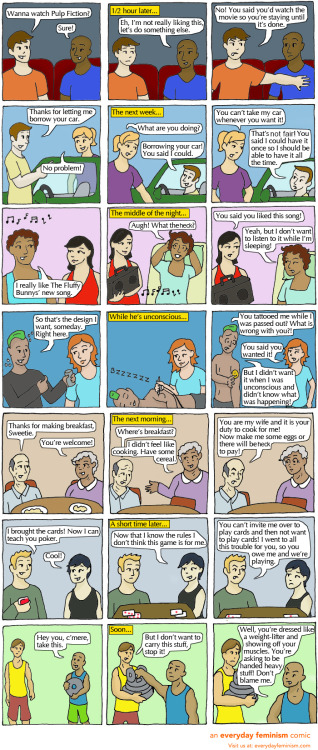Understanding Consent
Defining Consent
Consent
A voluntary agreement to engage in sexual activity.
- Someone who is incapacitated cannot consent;
- Past consent does not mean future consent;
- Silence or an absence of resistance does not imply consent;
- Consent to engage in sexual activity with one person does not imply consent to engage in sexual activity with another.
- Consent can be withdrawn at any time;
- Coercion, force or a threat of either invalidates consent.
Source: Not Alone: The First Report of The White House Task Force to Protect Students from Sexual Assault – Checklist for Campus Sexual Misconduct Policies, April 29, 2014.
Incapacitation
The physical and/or mental inability to make informed, rational judgments such as:
- Due to the use of drugs or alcohol;
- When a person is sleeping or unconscious;
- Due to an intellectual or other disability that prevents the person from having the capacity to give consent.
Source: Not Alone: The First Report of The White House Task Force to Protect Students from Sexual Assault – Checklist for Campus Sexual Misconduct Policies, April 29, 2014.
Obtaining Consent
It is important to understand that 90% of sexual assaults are committed by someone known to the victim; up to 78% of reported sexual assaults in college occur in a “hook up” context; and 75% or more of reported sexual assaults in college involve alcohol (click here for more information and statistics about sexual assault). Accordingly, understanding, communicating about, and obtaining consent are key steps in reducing the risk of sexual assault.
- Understand that mixing alcohol or drugs with sexual activity is always risky. Do not engage in sexual activity if either or both parties are intoxicated.
- Talk to your partner about your desires, limits and boundaries. Ask for - and obtain - consent. Sample questions to ask:
-
Is there anything you don't want to do?
-
I really want to hug/kiss... you. Can I? What do you want to do with me?
-
Have you ever...? Would you like to try it with me?
-
Does this feel good?
-
Do you want to stop?
-
Do you want to go further?
-
Are you ok?
-
- Listen and watch for signs that your partner is not consenting - remember - you are looking for an enthusiastic yes!
- Says something like: "no," "slow down," "I'm not comfortable," "that's enough," "can we just talk?";
- Not responding to your touch;
- Pushing you away;
- Holding their arms around their body;
- Turning away from you or hiding their face;
- Stiffening muscles;
- Tears; and/or
- Falling asleep or losing consciousness.
-
If your partner gives anything less than an enthusiastic yes, including the signs above, STOP what you are doing and ASK your partner if they're ok and if they want to continue.
- Respect your partner's decision: saying no or demonstrating the signs above does not mean "maybe" or "try harder."
